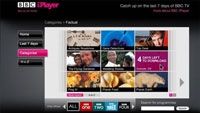Internet catch-up challenges TV in Europe

Just as in the United States, Internet television has become increasingly popular in Europe. So much so that some European broadcasters want to add the Internet to their broadcast programming schedule.
In Germany, the public television service is working on a plan that would allow viewers to watch programming from a week earlier via their personal computer. In Britain, the BBC and several partners are working on a more ambitious project to bring “catch-up” TV and a variety of other programming and interactive services to television sets as soon as next year.
So-called catch-up services, such as the BBC’s iPlayer in the UK and Hulu in the United States, have attracted millions of users on the Internet, allowing them to watch TV programs anytime and anywhere they want. Until now, this has only been available on personal computers.
A new technology is emerging here: hybrid television, which uses over-the-air transmission as well as broadband connections. Its supporters say it will open up possibilities similar to Apple’s iPhone, which allows independent developers to create customized applications. They envision watching a cooking program that ends with a page of links to similar, archived shows or to the Web sites of online retailers selling the ingredients.
Today’s European television allows only separate Web surfing or TV viewing. Though many broadcasters are fearful of undermining their current business models, TV ad revenue is so low that many are reconsidering.
One enterprise under consideration is Project Canvas, a hybrid TV partnership that grew out of Freeview, a digital, over-the-air TV system that broadcasts signals at no charge to viewers. Freeview is the main TV system in 10 million of the 25 million British homes with televisions.
Canvas would use the Freeview system to provide regularly scheduled programming, while a broadband connection would deliver Internet services as well as on-demand content. While some of these programs might require payment, nobody would have to subscribe. The BBC Trust, which oversees the BBC, is set to rule this autumn on whether Project Canvas will proceed.
The professional video industry's #1 source for news, trends and product and tech information. Sign up below.
The German hybrid TV project, which has lined up support from several French broadcasters and a range of technology companies, is less far-reaching and seeks to create a set of hybrid TV standards for broadcasters and makers of televisions and set-top boxes. Broadcasters could then create and market their own hybrid services.
